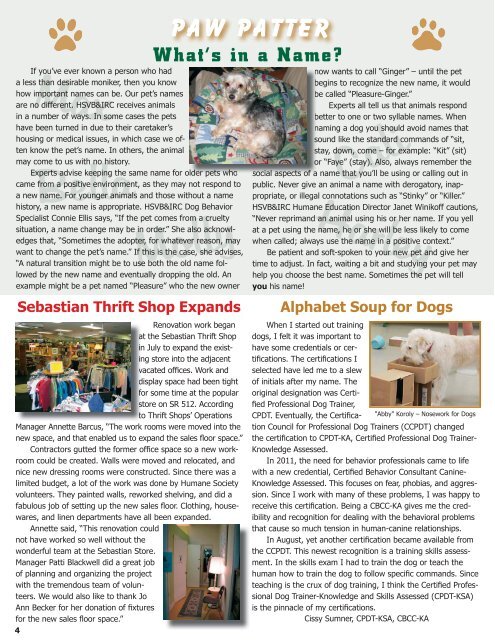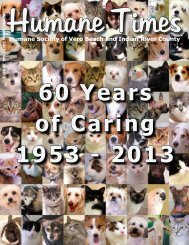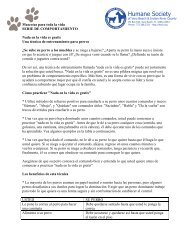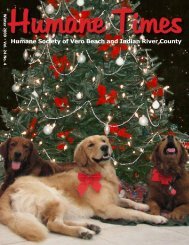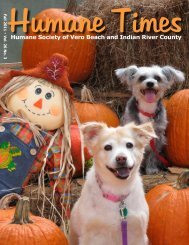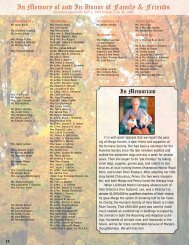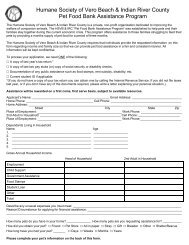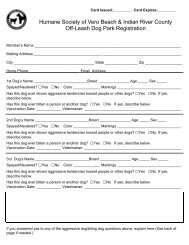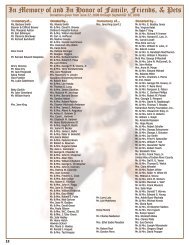Winter Edition - Humane Society of Vero Beach & Indian River County
Winter Edition - Humane Society of Vero Beach & Indian River County
Winter Edition - Humane Society of Vero Beach & Indian River County
Create successful ePaper yourself
Turn your PDF publications into a flip-book with our unique Google optimized e-Paper software.
Max<br />
If you’ve ever known a person who had<br />
a less than desirable moniker, then you know<br />
how important names can be. Our pet’s names<br />
are no different. HSVB&IRC receives animals<br />
in a number <strong>of</strong> ways. In some cases the pets<br />
have been turned in due to their caretaker’s<br />
housing or medical issues, in which case we <strong>of</strong>ten<br />
know the pet’s name. In others, the animal<br />
may come to us with no history.<br />
Experts advise keeping the same name for older pets who<br />
came from a positive environment, as they may not respond to<br />
a new name. For younger animals and those without a name<br />
history, a new name is appropriate. HSVB&IRC Dog Behavior<br />
Specialist Connie Ellis says, “If the pet comes from a cruelty<br />
situation, a name change may be in order.” She also acknowledges<br />
that, “Sometimes the adopter, for whatever reason, may<br />
want to change the pet’s name.” If this is the case, she advises,<br />
“A natural transition might be to use both the old name followed<br />
by the new name and eventually dropping the old. An<br />
example might be a pet named “Pleasure” who the new owner<br />
Bella<br />
Sebastian Thrift Shop Expands<br />
PAW PATTER<br />
What's in a Name?<br />
Renovation work began<br />
at the Sebastian Thrift Shop<br />
in July to expand the existing<br />
store into the adjacent<br />
<br />
display space had been tight<br />
for some time at the popular<br />
store on SR 512. According<br />
to Thrift Shops’ Operations<br />
Manager Annette Barcus, “The work rooms were moved into the<br />
<br />
<br />
room could be created. Walls were moved and relocated, and<br />
nice new dressing rooms were constructed. Since there was a<br />
limited budget, a lot <strong>of</strong> the work was done by <strong>Humane</strong> <strong>Society</strong><br />
volunteers. They painted walls, reworked shelving, and did a<br />
<br />
wares, and linen departments have all been expanded.<br />
Annette said, “This renovation could<br />
not have worked so well without the<br />
wonderful team at the Sebastian Store.<br />
Manager Patti Blackwell did a great job<br />
<strong>of</strong> planning and organizing the project<br />
with the tremendous team <strong>of</strong> volunteers.<br />
We would also like to thank Jo<br />
<br />
<br />
4<br />
now wants to call “Ginger” – until the pet<br />
begins to recognize the new name, it would<br />
be called “Pleasure-Ginger.”<br />
Experts all tell us that animals respond<br />
better to one or two syllable names. When<br />
naming a dog you should avoid names that<br />
sound like the standard commands <strong>of</strong> “sit,<br />
stay, down, come – for example: “Kit” (sit)<br />
or “Faye” (stay). Also, always remember the<br />
social aspects <strong>of</strong> a name that you’ll be using or calling out in<br />
public. Never give an animal a name with derogatory, inappropriate,<br />
or illegal connotations such as “Stinky” or “Killer.”<br />
HSVB&IRC <strong>Humane</strong> Education Director Janet Winik<strong>of</strong>f cautions,<br />
“Never reprimand an animal using his or her name. If you yell<br />
at a pet using the name, he or she will be less likely to come<br />
when called; always use the name in a positive context.”<br />
Be patient and s<strong>of</strong>t-spoken to your new pet and give her<br />
time to adjust. In fact, waiting a bit and studying your pet may<br />
help you choose the best name. Sometimes the pet will tell<br />
you his name!<br />
Cali<br />
Molly Harley<br />
Alphabet Soup for Dogs<br />
When I started out training<br />
dogs, I felt it was important to<br />
have some credentials or cer-<br />
<br />
selected have led me to a slew<br />
<strong>of</strong> initials after my name. The<br />
original designation was Certi-<br />
<br />
"Abby" Koroly – Nosework for Dogs<br />
tion Council for Pr<strong>of</strong>essional Dog Trainers (CCPDT) changed<br />
<br />
Knowledge Assessed.<br />
In 2011, the need for behavior pr<strong>of</strong>essionals came to life<br />
<br />
Knowledge Assessed. This focuses on fear, phobias, and aggression.<br />
Since I work with many <strong>of</strong> these problems, I was happy to<br />
<br />
ibility and recognition for dealing with the behavioral problems<br />
that cause so much tension in human-canine relationships.<br />
<br />
the CCPDT. This newest recognition is a training skills assessment.<br />
In the skills exam I had to train the dog or teach the<br />
<br />
<br />
sional Dog Trainer-Knowledge and Skills Assessed (CPDT-KSA)<br />
<br />
Cissy Sumner, CPDT-KSA, CBCC-KA


